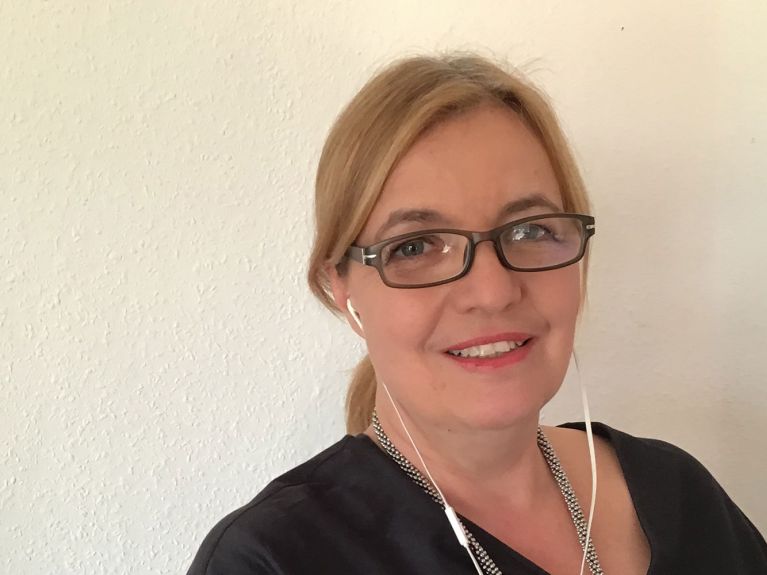“There is high demand for specialists in particular”
How do graduates find a job in Germany? Which professions are in highest demand? For answers, we spoke to Kerstin Krey, head of the project “Make it in Germany”.

The German economy needs specialists: at present, there are more than one million vacancies. A new law on immigration is opening up career opportunities in Germany for specialists from non-EU states in particular. In this interview, Kerstin Krey, head of the Federal Government’s information portal “Make it in Germany”, reveals the trades in highest demand and outlines what the coronavirus pandemic means for jobseekers.
Ms Krey, what can Germany offer graduates around the world?
Germany has a very receptive and thriving economy, and very low levels of unemployment. Our companies are desperately seeking skilled workers, mainly in the technical, engineering, automotive and health sectors. There is high demand for specialists in particular. Germany promises good working conditions, with legislation against unlawful dismissal, maternity rights, parental leave, strong unions and generous holiday.

Which graduate professions are in highest demand?
I would say the STEM trades, by which we mean science, technology, engineering and mathematics. Germany is a world leader not just in mechanical engineering, but also medical technology, as German-made ventilators have shown in the current coronavirus crisis. There is definitely a call for IT specialists, care sector professionals and medical staff. When the crisis is over, I expect to see even more sectors looking for employees.
How has the coronavirus crisis changed the picture for international jobseekers?
The coronavirus is transforming the economy as a whole. A lot of businesses, especially entertainment companies and restaurants, etc., have had to close their doors temporarily. The industrial sector is still moving, albeit with employees on short-time hours. This is not because orders dried up, but because it became increasingly difficult for companies to acquire the necessary materials. I hope and I believe that the economy will soon stabilise after the crisis and that the demand for specialists and skilled workers will still be there. Clearly, businesses are still very keen to attract the best international talent. The number of vacancies advertised on our jobs board has actually risen slightly. The Federal Foreign Office has an English-language information page for those planning to come to Germany.
Where do most applicants come from?
The top ten countries at present are India, the USA, Mexico, Indonesia, Egypt, Vietnam, Tunisia, Russia, Brazil and Italy, in that order. Some of these countries are consistently in the top ten, but there are fluctuations too – we notice it in the hit rates, for example, when a certain country passes a new treaty or a newspaper story appears. Political and economic events also affect developments: following the Euro crisis of 2012 in Spain, large numbers of Spaniards settled in Germany for a time. The United Kingdom was not even in the top 20 until two years ago, but interest has soared following Brexit. This was partly driven by British citizens already living in Germany who started considering naturalisation, but also by other EU citizens living in the UK who are now looking for an alternative.
In which sectors are these interested persons active?
For a long time, Make it in Germany has appealed to STEM-sector graduates, as well as medical staff and nurses. In some countries, the emphasis is on specific professions – for example, the Philippines and Vietnam train more nurses than they need. Dedicated programmes and bilateral agreements are in place to allow these specialists to come to Germany.
How will international applicants benefit from the new Skilled Immigration Act?
While studying in Germany, for instance, international students can now change to a different discipline, switch to a training course or accept a job offer. Prioritisation has ceased for all professions and training courses and jobseekers have been able to come and look for work since 1 March 2020. All nationalities have equal rights. To make sure international applicants are not exploited, though, we still have to check that wages and working conditions comply with standards.
Companies can also support the recruitment process directly: where a company opts to recruit an international applicant, the employer can initiate a so-called accelerated skilled worker immigration procedure into Germany.
What qualifications do international applicants need?
The most important qualification is German language ability. If an applicant only has a sketchy knowledge of German, this is not the end of the world – but they should aim to make good progress as quickly as possible. This will also help them in their private lives. In addition, international applicants should be independent, open and willing to engage with German culture.
----
Kerstin Krey heads the “Make it in Germany” project, a multi-lingual information and service portal of the Federal Government for specialists from abroad.
Interview: Marlene Thiele
